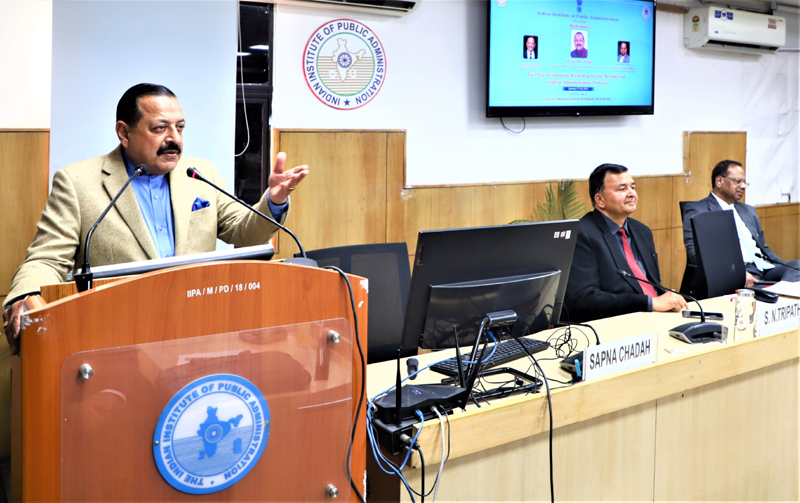
Excelsior Correspondent
NEW DELHI, Jan 27: Union Minister of State (Independent Charge) Science & Technology; Minister of State (Independent Charge) Earth Sciences; MoS PMO, Personnel, Public Grievances, Pensions, Atomic Energy and Space, Dr Jitendra Singh today said that under Prime Minister Narendra Modi’s leadership, the Government is constantly removing bottlenecks for faster disposal of litigations in Central Administrative Tribunal (CAT) across the country.
While addressing, the two-day Orientation Workshop for the Members of Central Administrative Tribunal at Indian Institute of Public Administration (IIPA) in New Delhi today, Dr. Jitendra Singh, who is also the Chairman, IIPA Executive Council, said that the Government, in last 8 years, has repealed around 2000 laws which had become obsolete. He said that the Government has looked forward and made efforts to reduce the burden of the judiciary by simplifying procedures and removing hurdles.
Singh also launched the Namani Gange Calendar on the occasion. Chairman, Central Administrative Tribunal, Justice Ranjit Vasantrao More, Rashmi Chowdhary, Additional Secretary, DoPT, SN Tripathi, IIPA and several other senior officials were present on the occasion.
He said that while conceptualising idea of Central Administrative Tribunal (CAT), it was expected that the setting up of such Administrative Tribunals to deal exclusively with service matters would go a long way in not only reducing the burden of the various Courts and thereby giving them more time to deal with other cases expeditiously but would also provide to the persons covered by the Administrative Tribunals speedy relief in respect of their grievances.
The Union Minister said that with the increasing pendency of litigation before the High Courts, the theory of ‘alternative institutional mechanisms’ has also been propounded to defend the establishment of Administrative Tribunals. He noted that these Administrative Tribunals are expected to function as a viable substitute for the High Courts.
The Central Administrative Tribunal (CAT) was set up on 01.11.1985 with Benches at five places. As on date, it has 19 regular Benches, 17 of which operate at the principal seats of High Courts and the remaining two at Jaipur and Lucknow. Both the newly created Benches at Jammu and Srinagar have been made functional.
He noted that the disposal rate by CAT, on an average, has been above 90%. He said that there is no doubt that the Central Administrative Tribunal has come a long way and is rightly being characterised by the uniqueness in its jurisdiction and procedure. Freedom from the long drawn mandatory procedural technicalities has enabled it to achieve an unmatched disposal rate.
On the issue of delay, which continues to affect the system in the matter of resolution of service disputes, Dr. Singh said that it has been generally noted that the disposal of the applications before the Administrative Tribunal always has been expeditious and hardly there is pendency of old cases in most of the Benches.

